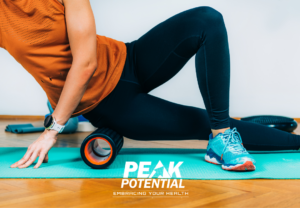Attention weekend warriors. . .
Did you over do your work out or you recreation this long holiday weekend?
Read on to find out how to quickly recover and return to work Tuesday
PAIN FREE!
Recovery time is often an overlooked aspect of training. You may have
heard people say you don’t build muscle during your workouts, you build
it between them. Your body builds during the time you are resting,
refueling, and recovering.
If you push on without a time of recovery, your performance will be
compromised, you will fatigue sooner, and you will increase risk of injury.
If you exercise, or overexert a particular muscle, the muscle fibers
experience micro-tears. These small tears are a normal, but take 24-48
hours to repair. It’s during repair that the muscle is able to build itself
back bigger and stronger than before.
If you pushed your muscles this week with two a day workouts, long
bike rides, or even yard work, I know you want to recover as quickly
and pain free as possible. In fact, tomorrow morning would be an ideal
time to feel “good as new” so you aren’t limping into work or popping
Aspirin to make it through the work day.
Although time is a factor, there things you can do to care for your body
allowing it to rebuild correctly and recover quickly.
1. STRETCH
We all know we need to stretch to prevent injury, but is is very important
part of recovery that doesn’t get the time it deserves. The purpose of
stretching in recovery is to maintain the flexibility of tissues that are
stiff from activity and ensure they repair and heal in the correct position.
Static or isolated stretching may be best for recovery. You hold a stretch
in a position for a longer period of time (at least 30 seconds) to allow for
tissue changes to occur.
2. REFUEL
Use proper nutrition to refuel your body. A well rounded set of carbohydrates,
proteins, and healthy fats will help your body recover the parts of your body
stressed during exercise. For added benefit incorporate some anti inflammatory
foods such as cherries, pineapple, kale, or salmon. You can even experiment
with adding anti inflammatory spices to your post workout meals such as
ginger, turmeric, or garlic.
3. HYDRATE
Proper hydration is necessary to replenish fluids lost during exercise.
Additional water is also needed take care of your joints, hydrate your muscles,
and eliminate waste that builds up in your system during exercise.
4. SUPPLEMENT
From lemon juice, probiotics, protein, or greens powder, supplements are often
used as a recovery tool. Unfortunately, we can’t give you a one size fits all
answer to what you should be supplementing with. Factors such as medical
history, nutrition habits, the activities you participate in, and the goals you have
for training all play a role in your bodies individual needs. It’s best to talk one on
one with your health care provider to establish a safe and effective supplement
routine. As physical therapists, athletic trainers, and personal trainers at Peak
Potential Physiotherapy & Wellness, we would be happy to have this discussion
with you as well.
5. MASSAGE
If you are lucky enough to be able to get a massage in, this can be an optimal
way to recover aching muscles. Not just a “feel good” massage, but one that
breaks up scar tissue, increases blood flow, and improves range of motion
will decrease muscle soreness significantly.
6. SOAK
Spend at least 20 minutes in a hot bath. The warmth improves circulation,
sending more oxygen and nutrient rich blood to the rescue of aching muscles.
Add Epsom salt, as its primary component Magnesium helps regulate muscle
and nerve function. By relaxing muscles and flushing toxins, magnesium can
decrease next day muscle stiffness and soreness.
7. SLEEP
Lastly, get a good night sleep. This is the time our bodies repair our muscular,
cardiovascular, skeletal, and immune systems in order that they can function
better when we wake the next day. So, go to bed early with a plan to get at least
7-8 hours of sleep before you return to work tomorrow.
Muscle soreness is a healthy and expected result of exercise. Muscles that are
tender, tired, tight, or achy for 24-72 hours after an activity can be absolutely
normal. However, if pain is sharp, relentless, or lasting >72 hours, it is likely an
abnormal response and indicative of injury.
This type of pain may continue to linger making it difficult to return to your
normal activity or the exercise that induced the pain. If you find yourself in
this position as the week goes on, contact your physical therapist who can assist
in initial pain management, identify and address the root of the problem, and
take steps to preventing any further problems.
Call us today with any questions or concerns you have 901-316-5456!




